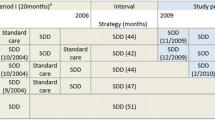Summary
Eighty-four patients with lower respiratory tract infections participated in a randomised double-blind parallel multicenter trial in order to compare the efficacy of cefaclor and amoxycillin as treatment for lower respiratory tract infections and their ability to influence colonization resistance. Cefaclor was given to 40 patients and amoxycillin to 44 patients perorally in doses of 250 mg t.i.d. for seven days in a double-blind fashion. Sputum, oropharyngeal and intestinal specimens were taken for microbial analysis to isolate the causative pathogen of the lower respiratory tract infection and to follow the microflora changes before, during and after antibiotic treatment. The clinical outcome showed 92.5% cured or improved patients on cefaclor versus 88.4% on amoxycillin. The difference in clinical outcome between the two treatment groups was not statistically significant. Among the pathogenic bacteria isolated,Haemophilus influenzae, Branhamella catarrhalis andStreptococcus pneumoniae dominated. There was no difference between the two treatments with regard to microbiological efficacy. Treatment with cefaclor did not cause any significant impact on the oropharyngeal microflora. Administration of amoxycillin caused a significant reduction of the number ofStreptococcus salivarius andVeillonella cocci, while an increase in number of enterobacteria was seen in the oropharyngeal microflora. In the intestinal flora, cefaclor significantly reduced the number of streptococci, staphylococci and anaerobic cocci, while the number of enterococci, enterobacteria, bacteroides andCandida albicans significantly increased. The intestinal microflora was partly influenced by amoxycillin treatment. Thus there was a significant increase in the number of enterobacteria, anaerobic gram-positive rods and bacteroides. In conclusion, none of these agents caused any major disturbances in the colonization resistance in patients with lower respiratory tract infections.
Zusammenfassung
84 Patienten mit tiefen Atemwegsinfektionen wurden in einer randomisierten, doppelblind parallel geführten multizentrischen Studie mit Cefaclor oder Amoxicillin behandelt. Dabei wurde der Einfluß der Antibiotikatherapie auf die Kolonisationsresistenz untersucht. 40 Patienten erhielten Cefaclor, 44 Amoxicillin; die Dosierung betrug jeweils 250 mg dreimal täglich per os. Die Behandlung wurde sieben Tage lang durchgeführt. Vor, während und nach Antibiotikatherapie wurden Proben von Sputum, Abstriche aus dem Oropharynx und Stuhl entnommen. Die mikrobiologischen Untersuchungen dienten einerseits der Erregeridentifikation, andererseits der Verlaufskontrolle der Veränderungen der Mikroflora. Unter Cefaclor wurden 92,5%, unter Amoxicillin 88,4% der Patienten geheilt oder gebessert. Dieser Unterschied war nicht statistisch signifikant.Haemophilus influenzae, Branhamella catarrhalis undStreptococcus pneumoniae waren die häufigsten Erreger der Atemwegsinfektionen. In der Erregereradikationsrate unterschieden sich die beiden Therapien nicht. Unter Cefaclor traten keine wesentlichen Veränderungen der oropharyngealen Flora auf. Amoxicillin führte zu einer signifikanten Reduktion der Keimzahlen vonStreptococcus salivarius undVeillonella, die Enterobakterien nahmen in der oropharyngealen Mikroflora zu. Cefaclor führte zu einer signifikanten Verminderung der Keimzahlen von Streptokokken, Staphylokokken und anaeroben Kokken im Stuhl während Enterokokken, EnterobakterienBacteroides undCanadida albicans signifikant zunahmen. Auch Amoxicillin hatte zu Veränderungen der intestinalen Mikroflora mit Zunahme der Enterobakterien, anaerober grampositiver Stäbchen undBacteroides geführt. Stärkere Störungen der intestinalen Kolonisationsresistenz traten mit keiner der beiden Therapien auf.
Similar content being viewed by others
References
van der Waaij, D. Colonization pattern of the digestive tract by potentially pathogenic microorganisms: Colonization-controlling mechanisms and consequences for antibiotic treatment. Infection 11 (1983) 90–92.
Nord, C. E., Heimdahl, A., Kager, L. Antimicrobial induced alterations of the human oropharyngeal and intestinal microflora. Scand. J. Infect. Dis. 49 (1986) 64–72.
van Saene, H. K. F., Willems, F. Th. C., Zweens, J. Influence of amoxycillin and cefaclor on the colonization resistance of oropharynx. Scand. J. Infect. Dis., Suppl. 39 (1983) 97–99.
Lennette, E. H., Balows, A., Hausler, W. J., Jr., Shadomy, H. J. (eds. Manual of Clinical Microbiology. ASM, Washington 1985.
Heimdahl, A., Nord, C. E. Effect of phenoxymethylpenicillin and clindamycin on the oral, throat and faecal microflora of man. Scand. J. Infect. Dis. 11 (1979) 233–242.
Sanders, C. C., Sanders, W. E. An antibiotic produced byStreptococus salivarius that may contribute to protection against infections due to group A streptococci. J. Infect. Dis. 146 (1982) 683–690.
Sprunt, K., Leidy, G. A., Redman, W. Prevention of bacterial overgrowth. J. Infect. Dis. 123 (1971) 1–10.
Author information
Authors and Affiliations
Rights and permissions
About this article
Cite this article
Christensson, B., Nilsson-Ehle, I., Ljungberg, B. et al. A randomized multicenter trial to compare the influence of cefaclor and amoxycillin on the colonization resistance of the digestive tract in patients with lower respiratory tract infection. Infection 19, 208–215 (1991). https://doi.org/10.1007/BF01644947
Received:
Accepted:
Issue Date:
DOI: https://doi.org/10.1007/BF01644947




